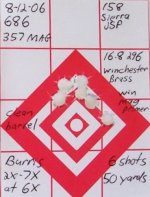I'd tell you to ask Todd Green were he not deceased:
https://pistol-forum.com/showthread.php?9-2-000-Round-Challenge
I'd say the point is to test to the reliability and durability of the revolver, see if it can hang with the semi-autos, and a fun reason to fire 2000 rounds through it. Obviously I didn't come up with the challenge. The only revolver I saw in that thread was a Ruger LCR which had its cylinder latch fall off toward the end. The only reason I wouldn't do it is if it could cause some kind of significant damage to the pistol. Things like this just seem fun to me, although I realize that it would probably "trigger" many people who are obsessive/compulsive about gun cleaning:
Ol' Dirty
You say more dirt equals more wear. Can you expand on this? Could I expect the revolver to develop timing problems? Will internal parts and springs wear out faster than they otherwise would?
Even then, it's not as if it's some rare irreplaceable firearm that needs to be treated delicately for preservation. A new 629 be replaced any time with a 10 minute trip to Cabela's or most any gun shop in town.
Not worried about the cost of the ammo, that money is going to be spent whether the challenge is done or not. It doesn't cost that much if you reload anyway.

